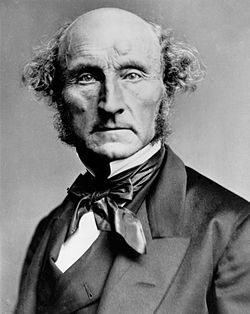John Stuart Mill Quote
Tant qu’une opinion est implantée sur les sentiments, elle défie les arguments les plus décisifs ; elle en tire de la force au lieu d’en être affaiblie : si elle n’était que le résultat du raisonnement, le raisonnement une bonne fois réfuté, les fondements de la conviction seraient ébranlés ; mais, quand une opinion n’a d’autre base que le sentiment, plus elle sort maltraitée d’un débat, plus les hommes qui l’adoptent sont persuadés que leur sentiment doit reposer sur quelque raison restée hors d’atteinte. Tant que le sentiment subsiste, il n’est jamais à court de théories ; il a bientôt réparé les brèches de ses retranchements.
John Stuart Mill
Tant qu’une opinion est implantée sur les sentiments, elle défie les arguments les plus décisifs ; elle en tire de la force au lieu d’en être affaiblie : si elle n’était que le résultat du raisonnement, le raisonnement une bonne fois réfuté, les fondements de la conviction seraient ébranlés ; mais, quand une opinion n’a d’autre base que le sentiment, plus elle sort maltraitée d’un débat, plus les hommes qui l’adoptent sont persuadés que leur sentiment doit reposer sur quelque raison restée hors d’atteinte. Tant que le sentiment subsiste, il n’est jamais à court de théories ; il a bientôt réparé les brèches de ses retranchements.
Related Quotes
About John Stuart Mill
John Stuart Mill (20 May 1806 – 7 May 1873) was an English philosopher, political economist, politician and civil servant. One of the most influential thinkers in the history of liberalism and social liberalism, he contributed widely to social theory, political theory, and political economy. Dubbed "the most influential English-speaking philosopher of the nineteenth century" by the Stanford Encyclopedia of Philosophy, he conceived of liberty as justifying the freedom of the individual in opposition to unlimited state and social control. He advocated political and social reforms such as proportional representation, the emancipation of women, and the development of labour organisations and farm cooperatives.
The Columbia Encyclopedia describes Mill as occasionally coming "close to socialism, a theory repugnant to his predecessors". He was a proponent of utilitarianism, an ethical theory developed by his predecessor Jeremy Bentham. He contributed to the investigation of scientific methodology, though his knowledge of the topic was based on the writings of others, notably William Whewell, John Herschel, and Auguste Comte, and research carried out for Mill by Alexander Bain. He engaged in written debate with Whewell. A member of the Liberal Party and author of the early feminist work The Subjection of Women, Mill was also the second Member of Parliament to call for women's suffrage after Henry Hunt in 1832.
The Columbia Encyclopedia describes Mill as occasionally coming "close to socialism, a theory repugnant to his predecessors". He was a proponent of utilitarianism, an ethical theory developed by his predecessor Jeremy Bentham. He contributed to the investigation of scientific methodology, though his knowledge of the topic was based on the writings of others, notably William Whewell, John Herschel, and Auguste Comte, and research carried out for Mill by Alexander Bain. He engaged in written debate with Whewell. A member of the Liberal Party and author of the early feminist work The Subjection of Women, Mill was also the second Member of Parliament to call for women's suffrage after Henry Hunt in 1832.
